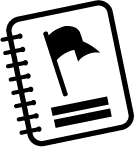Families everywhere go through times in their lives when they need help understanding their infant or toddler and accessing information to help them navigate new circumstances or challenges. Families may have a question or concern, and you may be asked to provide information, suggestions, or recommendations about a variety of topics such as child development, challenging behavior, language, community connections, services providers, etc. Sometimes you may have answers and sometimes you may have to look for answers. Sometimes the conversations you need to have with families will be difficult. If you have questions about how to handle situations in which families share information with you, or you need to know how to address a concern with a family, talk to your coach, trainer, administrator, or program director. You may also consider some of the suggestions and ideas listed below:
- Establish relationships and effective communication with the family early on.
- Create a comfortable atmosphere for meetings and choose times when everyone can feel relaxed and have time to talk.
- Share strength-based information that is easy to understand, objective, and nonjudgmental.
- Arrange for someone to translate information if a family speaks a language unfamiliar to you.
- Think about your own cultural beliefs and values; consider ways these ideas affect your caregiving practices – consider possible differences in culture, values, opinions, and practices.
- Ask families questions and think about what it is like to be the primary caregiver of the infant or toddler you are discussing.
- Describe behaviors by sharing what you see and hear and ask families questions about behaviors at home:
- “Today I saw her ________. What are you seeing her do at home?”
- “He seems to like books. You must spend lots of time reading together at home. What else does he really like to do?”
- Ask families for feedback; provide time for families to think, process, and respond.
- Help families learn more about infant and toddler development.
- Help families make connections with community resources and organizations.
It is also helpful for you to be aware of existing services and approaches to early identification and intervention for infants, toddlers, and families. To learn more, consider seeking information by:
- Reviewing your program policies and documentation regarding screening and processes to determine the best approach to conversations with families.
- Reviewing your program policies related to making referrals if concerns emerge in an infant’s or toddler’s development.
- Identifying community services such as health consultation and mental health consultation.
- Knowing about your state’s early intervention system.


